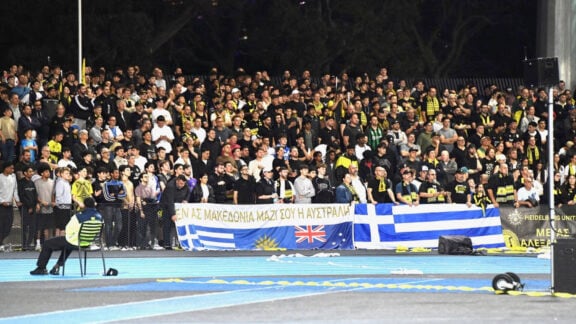March 13 marked the first milestone in the career of Labor leader Bill Shorten. It marked his first six months in the leadership of the opposition, following his epic win against the popular leadership contender, Anthony Albanese, shadow minister for Infrastructure and Transport.
Shorten had a dream first six months in the demanding position of the leader of a political party which was annihilated in the September national elections. His popularity is unusually high for a leader of a political party punished severely by the electorate for disunity and loss of focus while at the helm of the nation.
In a frank interview with Neos Kosmos, Mr Shorten confessed that “the journey thus far has being very demanding, but rewarding” and declared Labor’s readiness to tough it out with the Abbott government on key issues.
“Yes, we received the message at the last election but all of that belongs to the past. Post-election Labor is charting its road back to power with alternative policies which deal with the issues pertaining to the needs of the country and its people,” he declares.
The migrant communities of Australia, the Greek community included, are, according to Mr Shorten, part of Labor’s plan to regain power.
“Part of Labor’s road back to power is to engage with the migrant communities of Australia, and the Greek community is an important one. Labor has the foundation of a strong relationship with the Greeks that arrived in Australia after World War Two and we look forward to strengthening this relationship. Labor and the Greek community of Australia are bonded by history to common struggles for freedom, support of the underprivileged, of the newly arrived migrant, of the frail, the elderly, of the sick and the disabled. We must maintain and strengthen this bond for the benefit of our multicultural Australia,” he states.
The leader of the opposition is highly critical of the decision of the Abbot government to discontinue funding to migrant volunteer organisations. Shorten interprets thedecision as blatant disregard of multiculturalism by the conservative side of politics.
“Labour governments supported fully multiculturalism and we are determined to do more. I was appalled when the government discontinue the funding to volunteer community organisations” he said.
“We believe there is a great need for ethnospecific services to the elderly migrant, for language teaching, for speedier recognition of overseas qualifications, for bridging courses that will enable newcomers to get employment and integrate in to our society.
It goes without saying that these services will benefit repatriating Greek-Australians to resettle in Australia”.
He is equally critical of the attempt of the government to repeal article18C of the Racial Discrimination Act and rejects the argument that the much discussed article limits freedom of speech.
“They are just wrong. I will give George Brandis credit for one thing. He has united everyone, from aborigines to Catholics, Orthodox, Jews, Buddhist, Muslims. The problem is he has united everyone against him.
We in the Labour Party understand the importance of Article 18C and we commit to keep the Racial Discrimination ACT. We in the Labour Party disagree with the view expressed by the government and some anglosaxone libertarians that Article 18C restricts freedom of expression. In a free democratic society such as ours we acknowledge the need of public discussion of issues of interest, such as should we or should we not have a national airline or a motor car industry. But as far as we are concerned there is no alternative to Article 18C. There is no sustainable case for change” he explains.








